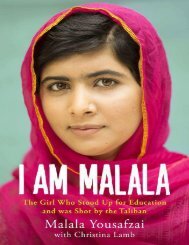i-am-malala-pdf-book-by-malala-downloaded-4m-pakistanifun.commalala-yousafzai-christina-lamb-converted
free ebook read more story visit xnxx-video.ga
free ebook
read more story visit xnxx-video.ga
Create successful ePaper yourself
Turn your PDF publications into a flip-book with our unique Google optimized e-Paper software.
We lived in Mingora, the biggest town in the valley, in fact the only city. It used to be a small place<br />
but many people had moved in from surrounding villages, making it dirty and crowded. It has hotels,<br />
colleges, a golf course and a f<strong>am</strong>ous bazaar for buying our traditional embroidery, gemstones and<br />
anything you can think of. The Marghazar stre<strong>am</strong> loops through it, milky brown from the plastic bags<br />
and rubbish thrown into it. It is not clear like the stre<strong>am</strong>s in the hilly areas or like the wide River Swat<br />
just outside town, where people fished for trout and which we visited on holidays. Our house was in<br />
Gulkada, which means ‘place of flowers’, but it used to be called Butkara, or ‘place of the Buddhist<br />
statues’. Near our home was a field scattered with mysterious ruins – statues of lions on their<br />
haunches, broken columns, headless figures and, oddest of all, hundreds of stone umbrellas.<br />
Isl<strong>am</strong> c<strong>am</strong>e to our valley in the eleventh century when Sultan Mahmud of Ghazni invaded from<br />
Afghanistan and bec<strong>am</strong>e our ruler, but in ancient times Swat was a Buddhist kingdom. The Buddhists<br />
had arrived here in the second century and their kings ruled the valley for more than 500 years.<br />
Chinese explorers wrote stories of how there were 1,400 Buddhist monasteries along the banks of the<br />
River Swat, and the magical sound of temple bells would ring out across the valley. The temples are<br />
long gone, but almost anywhere you go in Swat, <strong>am</strong>id all the primroses and other wild flowers, you<br />
find their remains. We would often picnic <strong>am</strong>ong rock carvings of a smiling fat Buddha sitting<br />
crosslegged on a lotus flower. There are many stories that Lord Buddha himself c<strong>am</strong>e here because it<br />
is a place of such peace, and some of his ashes are said to be buried in the valley in a giant stupa.<br />
Our Butkara ruins were a magical place to play hide and seek. Once some foreign archaeologists<br />
arrived to do some work there and told us that in times gone <strong>by</strong> it was a place of pilgrimage, full of<br />
beautiful temples domed with gold where Buddhist kings lay buried. My father wrote a poem, ‘The<br />
Relics of Butkara’, which summed up perfectly how temple and mosque could exist side <strong>by</strong> side:<br />
‘When the voice of truth rises from the minarets,/ The Buddha smiles,/ And the broken chain of<br />
history reconnects.’<br />
We lived in the shadow of the Hindu Kush mountains, where the men went to shoot ibex and golden<br />
cockerels. Our house was one storey and proper concrete. On the left were steps up to a flat roof big<br />
enough for us children to play cricket on. It was our playground. At dusk my father and his friends<br />
often gathered to sit and drink tea there. Sometimes I sat on the roof too, watching the smoke rise<br />
from the cooking fires all around and listening to the nightly racket of the crickets.<br />
Our valley is full of fruit trees on which grow the sweetest figs and pomegranates and peaches, and<br />
in our garden we had grapes, guavas and persimmons. There was a plum tree in our front yard which<br />
gave the most delicious fruit. It was always a race between us and the birds to get to them. The birds<br />
loved that tree. Even the woodpeckers.<br />
For as long as I can remember my mother has talked to birds. At the back of the house was a<br />
veranda where the women gathered. We knew what it was like to be hungry so my mother always<br />
cooked extra and gave food to poor f<strong>am</strong>ilies. If there was any left she fed it to the birds. In Pashto we<br />
love to sing tapey, two-line poems, and as she scattered the rice she would sing one: ‘Don’t kill doves<br />
in the garden./ You kill one and the others won’t come.’<br />
I liked to sit on the roof and watch the mountains and dre<strong>am</strong>. The highest mountain of all is the<br />
pyr<strong>am</strong>id-shaped Mount Elum. To us it’s a sacred mountain and so high that it always wears a necklace<br />
of fleecy clouds. Even in summer it’s frosted with snow. At school we learned that in 327 BC, even<br />
before the Buddhists c<strong>am</strong>e to Swat, Alexander the Great swept into the valley with thousands of




